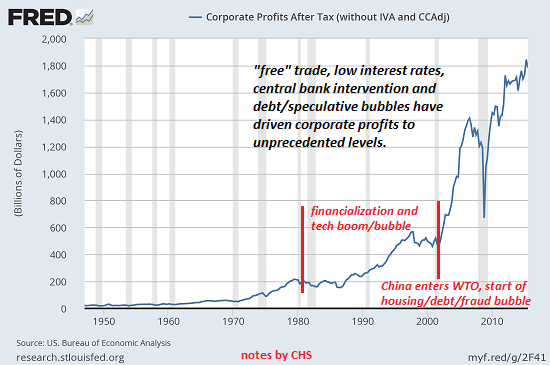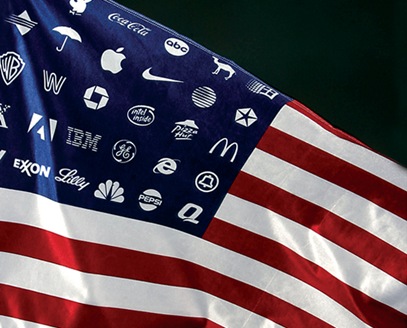This is what our mode of production optimizes: ugliness, debt-serfdom, and servitude to politically dominant corporations.
An insightful correspondent recently remarked on the striking transition of American neighborhoods from commercial districts dominated by locally owned businesses to streets lined with look-alike outlets of Corporate America. This transition is so obvious that few even comment on it, much less ask if this wholesale replacement is in the best interests of residents and consumers.
|
I have long suggested starting any inquiry with a simple question: cui bono— to whose benefit? Let’s add a second essential question: what does the system optimize?
By this I mean: what is optimized by the infrastructure, regulations, political structure, etc.–what we call the mode of production.
I think it’s abundantly clear that our mode of production optimizes large-scale global corporations, which have access to the capital and expertise needed to optimize production, management, employee training and discipline, supply chains and the purchase of political influence.
|
Corporate Profits After Tax 1950 - 2016 - Click to enlarge
|
| The net result of nearly-free credit for corporations is a Corporatocracy that constantly expands its financial and political power. Governments come and go, candidates come and go, and political movements come and go, but the Corporatocracy remains at the top of the power pyramid because it can always afford to “buy” as much democracy as it needs for the state to protect its power and profits.
Our mode of production optimizes the commoditization of everything: computer chips, fish and chips, labor, expertise, everything. It’s very convenient if you have a reliable vehicle; if not, tough luck–convenience is for those with cars. |
|
If you want a burger that’s essentially identical everywhere in the nation–i.e. a burger that has been ruthlessly commoditized–then Corporate America’s fast food chains are the place to go.
If you want a hotel room that’s identical to hundreds of other rooms, a store that has identical items and nearly identical layout no matter which outlet you enter– Corporate America’s chains are the place to go.
That this commoditization / homogenization has consequences other than low prices and convenience is not advertised. One consequence is every town and street in the country looks alike: a garish row of one corporate outpost after another.
The ugliness of this commoditized wasteland is so obvious that it’s assumed to be unavoidable.
Another consequence is entry-level commoditized jobs don’t teach new workers the wide spectrum of skills that once came with working for small businesses. Workers in Corporate America are taught the company’s system and trained to respond with genteel customer service in every interaction with customers.
How often do we hear something like “thank you for visiting Engulf and Devour” repeated semi-robotically?
Here’s another often-overlooked consequence: money flows out of the community to distant corporate headquarters, where it is distributed to obscenely wealthy managers and owners of the company’s stock.
When businesses were locally owned, all the profit and overhead generated by sales stayed in the community. What characterizes economically depressed ghettos isn’t just a lack of money–it’s the channeling of all the money in the community to distant Corporate HQs and predatory corporate chains such as payday lenders and credit card issuers (you’re going to love paying 25% interest!).
The low cost and convenience of commoditized Corporate America has high costs that we simply don’t measure: the ugliness of our shared spaces, the boring sameness of every commercial strip, the dearth of entry-level jobs outside a commoditizing corporate hierarchy, and the low property tax rates Corporate America “buys” with its immense lobbying machinery.
The low cost and convenience are presumed to make this colonization of locally owned businesses irresistible. Commoditizing everything certainly optimizes the efficient production and management of services and goods.
But how much has been lost to this wholesale colonization by globally optimized corporations? What price do we put on a diversity of locally owned businesses? What price do we put on the relative charm of a walkable street? How much property tax flows into the local government from a shuttered mall that lost its Corporate America anchor retailers?
Colonization introduces an amazing array of bargain-priced goods and services.The “natives” are happy to have access to all the goodies, but a short time later, the colonizers own the land, the markets, the politicians, the media and the labor force, and everyone who once had an independent livelihood and independent political voice is impoverished or is now an employee of the plantation, taking orders from the Big Boss.
This is what our mode of production optimizes: ugliness, debt-serfdom, and servitude to politically dominant corporations that have commoditized supply chains, marketing, the construction of outlets, the labor to operate them and the extraction of profits.
That’s how we’ve come to love our servitude–oops, I mean “low prices and convenience.”
My new book is The Adventures of the Consulting Philosopher: The Disappearance of Drake. For more, please visit the
book's website.
Full story here
Are you the author?
At readers' request, I've prepared a biography. I am not confident this is the right length or has the desired information; the whole project veers uncomfortably close to PR. On the other hand, who wants to read a boring bio? I am reminded of the "Peanuts" comic character Lucy, who once issued this terse biographical summary: "A man was born, he lived, he died." All undoubtedly true, but somewhat lacking in narrative.
Previous post
See more for 5.) Charles Hugh Smith
Next post
Tags:
newslettersent









































